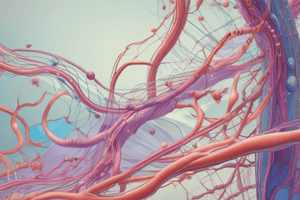Podcast
Questions and Answers
How many types of collagen have been identified in vertebrates?
How many types of collagen have been identified in vertebrates?
- 20
- 25
- 30
- 28 (correct)
What is the function of lysyl oxidases (LOX) in collagen synthesis?
What is the function of lysyl oxidases (LOX) in collagen synthesis?
- Hydroxylation of proline and lysine residues
- Cleavage of N- and C-terminal propeptides
- Glycosylation of lysine residues
- Covalent crosslinking between lysine residues (correct)
What is the role of cell contraction in FN-fibril assembly?
What is the role of cell contraction in FN-fibril assembly?
- It is not involved in FN-fibril assembly
- It promotes FN-fibril assembly (correct)
- It inhibits FN-fibril assembly
- It has no effect on FN-fibril assembly
What is the function of fibrous collagens?
What is the function of fibrous collagens?
How is fibronectin secreted?
How is fibronectin secreted?
What is the result of the cleavage of N- and C-terminal propeptides in collagen synthesis?
What is the result of the cleavage of N- and C-terminal propeptides in collagen synthesis?
Fibronectin is secreted as a monomer joined by a single C-terminal disulfide bond.
Fibronectin is secreted as a monomer joined by a single C-terminal disulfide bond.
The majority of collagen molecules form a double-stranded helix.
The majority of collagen molecules form a double-stranded helix.
Network collagens are incorporated into the interstitial tissue stroma.
Network collagens are incorporated into the interstitial tissue stroma.
Glycosylation of proline residues is a post-translational modification involved in collagen type I synthesis.
Glycosylation of proline residues is a post-translational modification involved in collagen type I synthesis.
The binding of fibronectin to heparin is not essential for its assembly into longer fibrils.
The binding of fibronectin to heparin is not essential for its assembly into longer fibrils.
Collagen fibrils are strengthened by the covalent crosslinking between proline residues of the constituent collagen molecules.
Collagen fibrils are strengthened by the covalent crosslinking between proline residues of the constituent collagen molecules.
Flashcards are hidden until you start studying
Study Notes
Collagen Synthesis
- 28 types of collagen have been identified in vertebrates
- Collagen molecules form a triple-stranded helix, which can assemble into supramolecular complexes like fibrils and networks
- Fibrous collagens form the backbone of collagen fibril bundles in interstitial tissue stroma
- Network collagens are incorporated into the basal membrane (BM)
Post-Translational Modifications in Collagen Synthesis
- Synthesis of collagen type I involves enzymatic post-translational modifications
- Modifications include hydroxylation of proline and lysine residues, glycosylation of lysine, and cleavage of N- and C-terminal propeptides
Collagen Fibril Formation
- Collagen fibrils are strengthened by covalent crosslinking between lysine residues of constituent collagen molecules by lysyl oxidases (LOX)
Fibronectin Synthesis and Assembly
- Fibronectin (FN) is secreted as a dimer joined by two C-terminal disulfide bonds
- FN has binding sites for other FN dimers, collagen, heparin, and cell-surface integrin receptors
- Cell-surface binding of soluble FN dimer is essential for its assembly into longer fibrils
- Cell contraction through the actomyosin cytoskeleton and integrin clustering promotes FN–fibril assembly
Collagen Synthesis
- 28 types of collagen have been identified in vertebrates
- Collagen molecules form a triple-stranded helix, which can assemble into supramolecular complexes like fibrils and networks
- Fibrous collagens form the backbone of collagen fibril bundles in interstitial tissue stroma
- Network collagens are incorporated into the basal membrane (BM)
Post-Translational Modifications in Collagen Synthesis
- Synthesis of collagen type I involves enzymatic post-translational modifications
- Modifications include hydroxylation of proline and lysine residues, glycosylation of lysine, and cleavage of N- and C-terminal propeptides
Collagen Fibril Formation
- Collagen fibrils are strengthened by covalent crosslinking between lysine residues of constituent collagen molecules by lysyl oxidases (LOX)
Fibronectin Synthesis and Assembly
- Fibronectin (FN) is secreted as a dimer joined by two C-terminal disulfide bonds
- FN has binding sites for other FN dimers, collagen, heparin, and cell-surface integrin receptors
- Cell-surface binding of soluble FN dimer is essential for its assembly into longer fibrils
- Cell contraction through the actomyosin cytoskeleton and integrin clustering promotes FN–fibril assembly
Studying That Suits You
Use AI to generate personalized quizzes and flashcards to suit your learning preferences.




